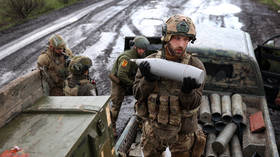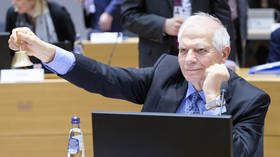EU admits it won’t keep Ukraine ammunition promise – media

The European Union will not meet its goal of supplying 1 million artillery shells to Ukraine by next March, Bloomberg has reported. Officials previously vowed to ramp up ammunition deliveries through direct transfers and deals with private industry.
The European External Action Service, the EU’s foreign policy wing, informed member states on the lagging progress of the ammunition drive this week, unnamed sources familiar with the discussions told the news agency.
While the bloc pledged to supply hundreds of thousands of 155-millimeter shells to Kiev earlier this year, hoping to reach 1 million by March 2024, so far it has provided just 30% of that figure, according to Bloomberg.
The proposal called to draw initial shipments directly from the stocks of EU member states, and to later sign contracts to procure shells from arms manufacturers, with an expected cost of around €2 billion. With just months before the deadline, however, it is unclear whether the target can be reached.
The issue is on the agenda for an EU defense ministers' meeting next week, where officials will also discuss billions in additional security aid to Ukraine. Some EU members have reportedly been hesitant to offer details about their ammunition stocks, and the bloc could soon request more information to determine whether it can meet its goal.
Ukrainian forces have burned through vast supplies of shells and other military gear amid the conflict with Moscow, with officials repeatedly urging foreign sponsors to deliver more arms and ammunition. Despite the Western largesse, however, Kiev’s summer counteroffensive failed to meet its objectives, with the Russian Defense Ministry estimating that Ukraine had lost more than 90,000 troops, along with over 55 tanks and 1,900 armored vehicles, since June.
The EU has authorized a total of €83 billion in military, economic and humanitarian aid to Ukraine since the start of Russia’s military operation in February 2022, according to the European Commission.
Moscow has argued that Western nations have already become de facto parties to the fighting by providing arms, intelligence-sharing and training to Kiev’s troops, and described the conflict as a US-led proxy war against Russia, in which Ukrainians are used as “cannon fodder.”













